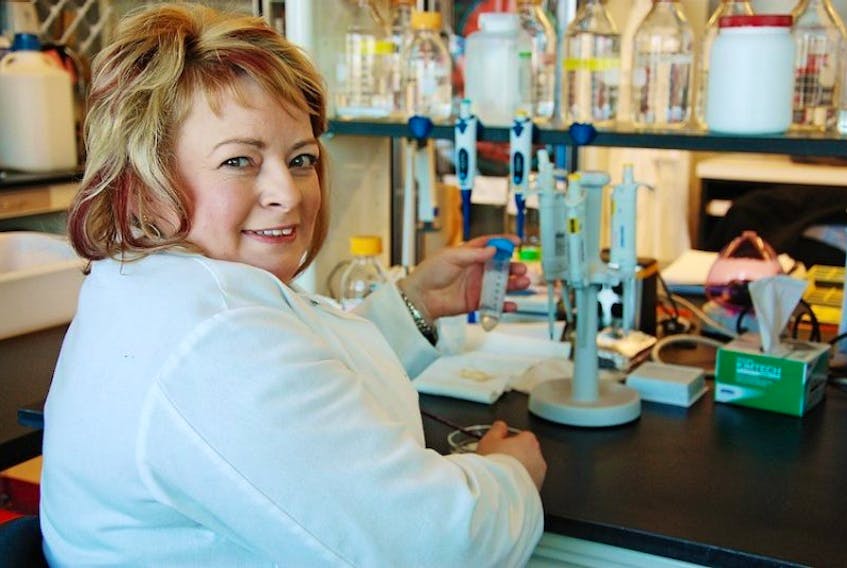Jackalina Van Kampen has been in the biotechnology field for many years, but her gender continues to make her feel like an outsider looking in.
“It’s definitely a boys’ club and it’s very difficult to break into it,’’ said Van Kampen.
Choosing her words carefully, the candid director of preclinical research at Neurodyn Inc. says women in the industry can offer valuable perspective and input to a company. The challenge, she stresses, is in being heard.
She finds that where men have a very narrow focus and women have different views on important issues such as where a product should go and how the research should go to support that product, it is very difficult to get men to listen and see her perspective.
Van Kampen says she is often left to channel her input through a supportive male colleague at Neurodyn.
“So we need both men and women because they do clearly think differently,’’ she said.
“And so they will be approaching problems from different perspectives. And I think all problems, both in academia and in biotechnology, need that.’’
Van Kampen didn’t try to filter her thoughts through a co-worker on Friday.
One of five guest speakers at a P.E.I. BioAlliance event celebrating women in the biotech business, Van Kampen urged women that are either in the field or interested in entering it to be true to themselves - and to their gender.
“Biotech doesn’t need women who pretend to be men,’’ she told the audience of roughly 100 female delegates that was sprinkled with less than a handful of men.
“Biotech needs women.’’
Ironically, Van Kampen’s boss, Neurodyn CEO Denis Kay spoke of the need to do more to entice women into the industry.
Speaking as a member of BioTalent Canada, Kay highlighted the fact that women are under-represented in biotech companies.
Sixty percent of university graduates in the physical and life sciences and technologies are female, he noted, yet according to recent BioTalent Canada research the number of biotech companies hiring women has decreased 11.5 percent since 2008.
“This is a valuable talent pool lost especially when a third of companies are experiencing a skills shortage,’’ said Kay.
“As the HR partner of Canada’s bio-economy, BioTalent Canada is focused on helping address these skills gaps.’’
Earlier this week, the Status of Women Canada announced a three-year project that will allow BioTalent Canada to engage stakeholders to identify the barriers women face entering and advancing in the biotech workforce.
Kay says strategies like mentoring programs, human resources initiatives and practical community specific programs will be explored to overcome the barriers.
“Local networks in Charlottetown, Montreal, Toronto and Vancouver will be developed to provide a grass roots approach to overcome the barriers in each biotech cluster and community,’’ he said.
“Successful women in biotech will be profiled as is happening here today.’’
Van Kampen said she felt “a lot of power’’ among the women gathered in the lecture theatre Friday at the Regis and Joan Duffy Research Centre at UPEI.
The five female speakers, including Vitrak Systems Inc. president Crystal Lavalee and Debbie Plouffe, vice president of research with the Centre for Aquaculture Technologies Canada, illustrated that some women certainly can attain positions of power and influence in the biotechnology field.
Still, Van Kampen says she is at a loss to provide any answers as to what must be done to open the biotech door wider to women.
Jackalina Van Kampen has been in the biotechnology field for many years, but her gender continues to make her feel like an outsider looking in.
“It’s definitely a boys’ club and it’s very difficult to break into it,’’ said Van Kampen.
Choosing her words carefully, the candid director of preclinical research at Neurodyn Inc. says women in the industry can offer valuable perspective and input to a company. The challenge, she stresses, is in being heard.
She finds that where men have a very narrow focus and women have different views on important issues such as where a product should go and how the research should go to support that product, it is very difficult to get men to listen and see her perspective.
Van Kampen says she is often left to channel her input through a supportive male colleague at Neurodyn.
“So we need both men and women because they do clearly think differently,’’ she said.
“And so they will be approaching problems from different perspectives. And I think all problems, both in academia and in biotechnology, need that.’’
Van Kampen didn’t try to filter her thoughts through a co-worker on Friday.
One of five guest speakers at a P.E.I. BioAlliance event celebrating women in the biotech business, Van Kampen urged women that are either in the field or interested in entering it to be true to themselves - and to their gender.
“Biotech doesn’t need women who pretend to be men,’’ she told the audience of roughly 100 female delegates that was sprinkled with less than a handful of men.
“Biotech needs women.’’
Ironically, Van Kampen’s boss, Neurodyn CEO Denis Kay spoke of the need to do more to entice women into the industry.
Speaking as a member of BioTalent Canada, Kay highlighted the fact that women are under-represented in biotech companies.
Sixty percent of university graduates in the physical and life sciences and technologies are female, he noted, yet according to recent BioTalent Canada research the number of biotech companies hiring women has decreased 11.5 percent since 2008.
“This is a valuable talent pool lost especially when a third of companies are experiencing a skills shortage,’’ said Kay.
“As the HR partner of Canada’s bio-economy, BioTalent Canada is focused on helping address these skills gaps.’’
Earlier this week, the Status of Women Canada announced a three-year project that will allow BioTalent Canada to engage stakeholders to identify the barriers women face entering and advancing in the biotech workforce.
Kay says strategies like mentoring programs, human resources initiatives and practical community specific programs will be explored to overcome the barriers.
“Local networks in Charlottetown, Montreal, Toronto and Vancouver will be developed to provide a grass roots approach to overcome the barriers in each biotech cluster and community,’’ he said.
“Successful women in biotech will be profiled as is happening here today.’’
Van Kampen said she felt “a lot of power’’ among the women gathered in the lecture theatre Friday at the Regis and Joan Duffy Research Centre at UPEI.
The five female speakers, including Vitrak Systems Inc. president Crystal Lavalee and Debbie Plouffe, vice president of research with the Centre for Aquaculture Technologies Canada, illustrated that some women certainly can attain positions of power and influence in the biotechnology field.
Still, Van Kampen says she is at a loss to provide any answers as to what must be done to open the biotech door wider to women.









